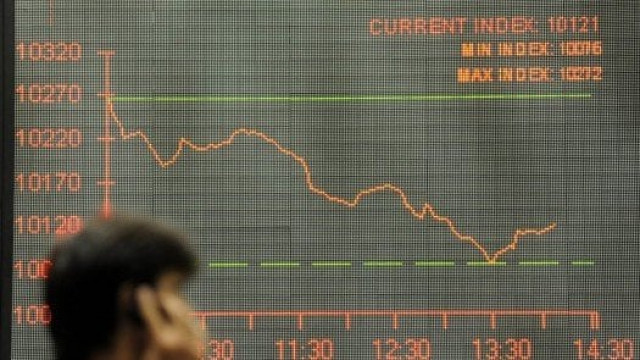KSE registers decline, regional markets start to recover

The KSE-100 went down by 3.5 per cent this week as compared to the previous week. It lost 166.26 points to end at 9,521.15 on Friday. However, despite the KSE’s decline this week, average daily volumes increased by 24 per cent to 103 million shares this week. The introduction of ready futures by May 31 2010 helped improve market sentiments during last trading day as this instrument is expected to improve the liquidity scenario at the bourse.
Expectations of measures to be announced in the forthcoming budget dictated market activity in the week.
Budget uncertainty
The Value Added Tax is expected to be implemented in the upcoming budget and the Capital Gains Tax on the stock market has investors worried and unwilling to invest. “An air of uncertainty loomed over the exchange ahead of the budget, as local participants remained wary by the eagerness of the government to levy taxes” said Farrah Marwat, an analyst at KASB Securities.
She added that, the government’s constrained fiscal position ensures that very few players will benefit from the budget. According to her, the lack of clarity on new measures remained a puzzle for investors. The State Bank of Pakistan (SBP) maintained its policy rate at 12.5 per cent in its policy statement. It mentioned inflationary pressures and revenue shortfall as the main causes for concern.
This did not affect the market as everyone expected it to happen. The policy rate has remained unchanged since Nov 2009. “SBP believes that borrowing from the banking system for budgetary support coupled with expected borrowing for commodity operations in 4QFY10 is jeopardising space for private sector credit, causing inertia in market interest rates,” said Rabia Tariq, an analyst at JS Global Capital.
Foreigners turn net sellers after 16 weeks
After 16 weeks of net buying, foreigners finally started selling. Foreign Institutional Investment outflows amounted to $0.63 million this week. Banks were also sellers of and sold $8.6 million. Companies emerged as net buyers of $5.5 million.
A breakdown of the decline
The decline was relatively broad based, according to analysts. The Energy and Production (E&P) sector was badly affected by falling international crude oil prices. It has been assumed that the banking sector’s tax rate may be increased by 2.5 per cent; this has put banking stocks under pressure. This proposal to increase the tax to 37.5 per cent with a spread greater than 5 per cent raises concerns about sector’s profitability. Other sectors like cement witnessed pressure due to the government’s stance to increase taxes at retail levels and to increase gas prices which will also inflate costs of production.



















COMMENTS
Comments are moderated and generally will be posted if they are on-topic and not abusive.
For more information, please see our Comments FAQ